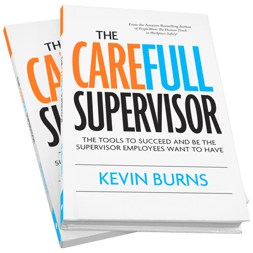Technical skills might promote you to a supervisor, safety or management position. But, it is your soft-skills that will keep you there.
Let's explore more of the Traits of Safety Leadership as we did in Part 1 (Traits 1-3) and Part 2 (Traits 4-6). This is Part 3 (Traits 7-9).
 Nothing affects an employee’s engagement levels more than the supervisor or manager (including safety people). The example set by the supervisor, safety person or manager is key to establishing the tone and culture of safety at work.
Nothing affects an employee’s engagement levels more than the supervisor or manager (including safety people). The example set by the supervisor, safety person or manager is key to establishing the tone and culture of safety at work.
Overbearing, critical and negative-focused supervisors can take their toll on employees. And these supervisors and managers cause employees to lose their motivation. As I wrote in my book PeopleWork: The Human Touch in Workplace Safety, employees want six things from the job - ahead of money. The information comes from TINYpulse survey of what motivates employees. Employees want:
- camaraderie (peer motivation)
- to do a good job
- encouragement and recognition
- to have real impact
- professional growth
- to meet client and customer needs.
Supervisors, safety people and managers who focus only on rules, procedure and production numbers miss the mark. Nothing in the TINYpulse list comes from being hyper-critical or overbearing.
This week, I want to offer you three softer skills that can connect you to employees in a way that gives them what they want from the job. This will help you build a better team relationship and create more influence in buying-in to safety.
7Optimism. Optimism is what keeps us looking ahead and moving forward. Optimism accompanies the pursuit of achievement. Optimism helps to keep teams moving forward when others might lose their motivation or sense of purpose. Leaders with a healthy sense of optimism are able to frame challenges in such a way that they no longer seem insurmountable. They are able to focus employees on the task. And, according to Psychology Today, can positively affect mental and physical health. That is a key element to a successful Health & Safety program. It is difficult to build a strong teamwork component without a healthy dose of optimism sprinkled in among reality.
8Respect. Supervisors who utter, “you’re lucky to have a job” are clearly not understanding respect. A study by Rotterdam School of Management found that at the top of employee wish lists was: Having a supervisor who treats me with respect. Without respect, employees are unlikely to get anything on the TINYpulse list: camaraderie, to feel like they’re doing a good job, encouragement, growth, or to feel that they are having an impact in a positive way. The basic premise of wanting to keep people safe is because you want to respect your people and their contributions. Without respect, you will not build a strong teamwork component within the safety framework. People don’t respect supervisors who don’t respect them first. And you won’t be considered a leader of influence. Perhaps, more like an annoyance that need to be tolerated. To shift that focus, start by viewing your people as good people who want to do good work and to be respected and appreciated for it.
9Happiness. People don’t follow people who seem annoyed, angry or negative for long. That gets old real quick. To help your co-workers in a positive way, you must be happy with who you are, where you are in your life and the contribution you’re making. If you’re not happy, you will not be much of a leader. If you can’t find your happiness, you will not be able to help your people find theirs. People who are unhappy, grumble. They complain. They whine. They are not team players. Unhappy people are the last people who should be in charge of leading teams. If you want to positively impact the safety performance of your team, start with your own happiness. It makes you more approachable and more influential. If you want your team to be happy and healthy in their safety work, you will have to show them the example of happy and healthy. Happiness is important to productivity. Research suggests that happy employees get more done. The best way to find your happiness is to help others find theirs. Safety should become more about showing your people how much they are valued. It should be less about hitting safety performance numbers.
 Technical skills might promote you to a supervisor, safety or management position. But, it is your soft-skills that will keep you there. Safety leaders have good people-skills. Soft-skills help you motivate and build positive teams. Getting positive performance is what safety leaders accomplish.
Technical skills might promote you to a supervisor, safety or management position. But, it is your soft-skills that will keep you there. Safety leaders have good people-skills. Soft-skills help you motivate and build positive teams. Getting positive performance is what safety leaders accomplish.
Kevin Burns has authored ten books on human performance and safety, including his most recent release, PeopleWork - The Human Touch in Workplace Safety. Buy it now on Amazon. Then, consider bringing Kevin's consulting expertise to your company or have him speak at a safety event.
©2017 ZeroSpeak Corporation and Kevin Burns.
No part of this post may be reproduced without the expressed consent of the author.


